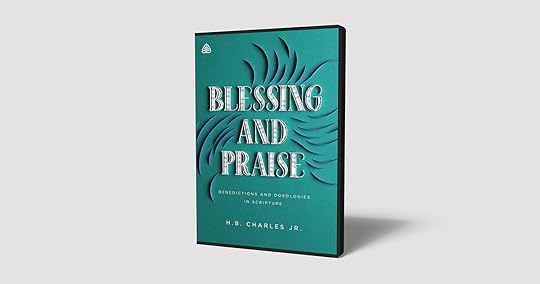R.C. Sproul's Blog, page 93
February 19, 2020
Blessing and Praise: A New Teaching Series from H.B. Charles Jr.

As creatures, we depend on our Creator for our every breath. Each day should be marked by adoration for who God is and what He has done. Throughout the pages of Scripture, we are reminded that this is to be the rhythm of our lives.
In this new video teaching series, Dr. H.B. Charles Jr. visits several of the Bible’s most instructive passages that summarize the blessings Christians enjoy from God and declare the praises worthy of His name. These theologically rich verses, called benedictions and doxologies, are given with an edifying purpose: to direct our worship and guide our daily walk with the Lord.
Eight 23-Minute Messages
1. The Ability of God
2. Equipped by God
3. Preserved by God
4. The Presence of God
5. Blessed by God
6. Sanctified by God.
7. Strengthened by God
8. Glorying in God
Watch This Brief Clip from Dr. Charles:
Watch the First Message for Free:
Purchase Options:
Purchase on DVD ($34.20)
Purchase on CD ($25.20)
Download audio and video ($14.40)
Purchase the corresponding study guide ($12.00)
Enroll on Ligonier Connect ($9.00/month)
Buy Now
H.B. Charles Jr. is pastor-teacher of Shiloh Metropolitan Baptist Church in Jacksonville, Fla. He is the author of several books, including It Happens After Prayer: Biblical Motivation for Believing Prayer. He is host of The On Preaching Podcast.


God's Good Pleasure in Election

If we are going to take the Bible seriously, we have to have some doctrine of predestination. The idea of predestination wasn’t invented by Calvin or Luther or Augustine. Paul says in Ephesians 1:4–6 that in love, God “predestined us for adoption to himself as sons through Jesus Christ, according to the purpose of his will, to the praise of his glorious grace, with which he has blessed us in the Beloved.” So, predestination is a biblical word, and it’s a biblical concept.
But the very concept of predestination raises the question, why does God elect certain people and not others? We know that it’s not based on anything that we do. It’s not based on our running, our willing, or our doing anything. It’s based solely on the purpose of God, as Paul says in Ephesians. But that raises another question: If the reason for the Lord’s selecting some to receive the tremendous benefit of salvation but not others is not rooted in those whom He chooses (Rom. 9:1–18), doesn’t that mean that somehow God is arbitrary?
Let’s take a moment to define what we mean by the term arbitrary. People who are arbitrary do what they do without any reason. They just do it, and when you ask them why they did it, they might respond, “No reason. Just on a whim.” We don’t have a lot of respect for capricious people who do things for no reason. Now, are we going to attribute to God that kind of impetuous or motiveless behavior—that He is arbitrary and capricious? Scripture certainly won’t allow us to do that.
Here we must make a distinction between God’s doing something for no reason and His doing something for no reason found in us. We say clearly that His grace is given not for any reason in us. But the fact that there is no reason in me for my salvation does not mean there is no reason behind God’s action. Scripture actually tells us over and over again that God has a reason behind His choice of some for salvation and His not choosing others for redemption.
Ephesians 1:11 fleshes out the purpose behind predestination by telling us that predestination is “according to the purpose of him who works all things according to the counsel of his will.” The counsel of God’s will has to do with the wisdom, the plan, the thought processes of God. The very word “counsel” suggests intelligence and an intelligent reason for acting, and God never wills apart from His own counsel. A person who is completely arbitrary has no counsel, takes no counsel, listens to no counsel. He just does it. And so the very word “counsel” should alert us that the biblical idea here of God’s sovereign grace is rooted in the wisdom of God, in His own thought, which is perfect. It’s not irrational—it’s eminently rational and far from arbitrary.
Another key word that is used again and again with respect to predestination and election in the Bible is the word “purpose.” We saw in Ephesians 1:4–6 that predestination is according to God’s purpose. Someone who does something arbitrarily does it for no purpose. But, the New Testament makes it clear that there is a divine purpose in God’s electing grace, and part of that is to make manifest the riches of His grace, to display His mercy (Rom. 9:22–24)—that is, to reveal something about His marvelous character, which His grace certainly does. It makes manifest His awesome, marvelous, beautiful mercy. There’s also another purpose, and that’s the purpose of honoring Christ. Remember the promise to Christ that He would see the travail of His soul and be satisfied (Isa. 53:11)? According to His own counsel, God determined from the foundation of the world that the cross of Jesus Christ would yield its appointed fruit and that Christ would be satisfied by the results of His pain, suffering, and death.
Notice that when the New Testament speaks of election and predestination, it always speaks of our being elect, or chosen, in the Beloved, in Christ. Ultimately, the New Testament tells us that people are chosen for salvation so that God the Father can bestow His glory, love, and affection on God the Son (Eph. 1:3–6). Ultimately, we’re redeemed not because of our worthiness but because of the worthiness of Christ. God is gracious to me in order to reward One who does deserve a reward—His only begotten Son. Do you see the intersection here of grace and justice? It is right or just that Christ should receive an inheritance, and we are that inheritance. That we are that inheritance is grace for us and justice for Christ.
The final thing I want to note is found in Ephesians 1:5. We are chosen “according to”—on the basis of—“the good pleasure” of God’s will (NKJV). God chooses and elects us according to what kind of pleasure? “According to the good pleasure of His will.” That word, “good,” makes all the difference in the world, because there’s no such thing as the bad pleasure of God’s will. God does not take pleasure in evil, even if we take pleasure in evil. In fact, we sin because it’s so pleasurable to us. If it weren’t pleasurable, we wouldn’t be enticed to it or tempted by it. But there is no evil will in God. The only thing that has ever pleased God is goodness, the only pleasure that He’s ever had is a good pleasure, and the only purpose that He’s ever had is a good purpose.
Clearly, then, in the mystery of the grace of God, He is never whimsical, capricious, or arbitrary. Though the reason for our salvation does not rest in us, that does not mean that God is without a purpose in choosing His elect. He does have a purpose, and it is a good one.
This post was originally published in Tabletalk magazine.


February 18, 2020
Ask Ligonier Live with W. Robert Godfrey

On February 18th, Dr. W. Robert Godfrey joined us as a special guest on our Ask Ligonier team to answer biblical and theological questions live online.
Dr. W. Godfrey is a Ligonier Ministries teaching fellow and chairman of Ligonier Ministries. He is president emeritus and professor emeritus of church history at Westminster Seminary California. His many books include Learning to Love the Psalms and Saving the Reformation.
This special online event was streamed live on Ligonier’s blog, YouTube, Facebook, and Twitter. You can also watch a recording of the event below.


The Parable of the Unforgiving Servant
Here’s an excerpt from The Parable of the Unforgiving Servant, Gerald Bilkes' contribution to the February issue of Tabletalk:
How many times should we forgive a fellow Christian who sins against us? This question comes to our mind, as it did to Peter’s lips one day while Jesus was talking to His disciples about church life, salvation, discipline, and repentance (Matt. 18:1–35).
Peter’s suggestion of seven times seems quite generous (v. 21). But Jesus responds to him by saying not seven times, but “seventy times seven” (v. 22). Jesus uses this way of speaking to say that our forgiveness of a repenting brother or sister cannot be bounded, much like the forgiveness that God grants to sinners. In other words, we should lose count when forgiving others.
Continue reading The Parable of the Unforgiving Servant, or begin receiving Tabletalk magazine by signing up for a free 3-month trial.
For a limited time, the new TabletalkMagazine.com allows everyone to browse and read the growing library of back issues, including this month’s issue.


February 17, 2020
If “No One Seeks for God,” Why Did Paul Call His Listeners to Seek God?

Left to ourselves, we will never seek after God. Why, then, does the Lord command people to seek Him? From one of our Ask R.C. events, R.C. Sproul helps us reconcile these biblical truths.
Do you have a biblical or theological question? We invite you to ask Ligonier.
Read the Transcript


Ask Ligonier with W. Robert Godfrey: Live Tomorrow at 7:00 p.m. ET

Tomorrow at 7:00 p.m. ET, Dr. W. Robert Godfrey will join us as a special guest on our Ask Ligonier team to answer your biblical and theological questions live online.
Dr. W. Godfrey is a Ligonier Ministries teaching fellow and chairman of Ligonier Ministries. He is president emeritus and professor emeritus of church history at Westminster Seminary California. His many books include Learning to Love the Psalms and Saving the Reformation.
Simply tweet us your questions by using the hashtag #AskLigonier or leave them as comments or messages on our Facebook page. This special online event will be streamed live on Ligonier’s blog, YouTube, Facebook, and Twitter. We hope you’ll join us tomorrow.


Martin Luther’s Death and Legacy

Martin Luther died on February 18, 1546. One month before, he wrote to a friend complaining of the infirmities of his age, "I, old, weary, lazy, worn-out, cold, chilly, and, over and above, one-eyed man." He then sighs, "Half-dead as I am, I might be left in peace."
Luther, however, would not be left in peace. His hometown of Eisleben faced a crisis. A dispute threatened the civil order and even the ecclesiastical order. Worn out as he was, Luther decided to travel to his hometown to settle the dispute. He set out from Wittenberg with his three sons, and a few servants. They made it to Halle. Ice and storms made crossing the rivers a challenge. Luther alternated between naming chunks of ice, floating directly toward their ferry, as Anabaptist opponents and as Roman Catholic bishops and popes. He might have been half-dead, but his humor was fully intact.
Halle was the home of Luther's longtime associate, Dr. Justus Jonas. Since the debate at Leipzig in 1519, Jonas was one of Luther's closest disciples. Jonas stood by him at the Diet of Worms. He moved the Reformation forward at Wittenberg, while Luther was in exile at the Wartburg. And now Justus Jonas would accompany Luther on his last trip.
Luther and his enlarged traveling party made a triumphal entry in to Eisleben. The hometown hero was welcomed with cheering crowds and escorted by a cavalcade. He preached that Sunday, January 31.
But the journey had taken its toll. Luther wrote to his beloved Katie of bitter winds and freezing rains, not to mention all those threatening chunks of ice. Luther was severely ill. An out of control fire, right outside of Luther's room, also threatened his life. His room itself was precarious. Plaster fell from the walls, which loosened a few of the stones from the wall. One stone, reported to be the size of a pillow, came rather close to crashing down upon the head of Luther. These misadventures gave reason for Katie to grow anxious back at home. She fired off a letter full of anxiety and worry. So Luther wrote back that he missed her, adding, "I have a caretaker who is better than you and all the angels; he lies in a manger and nurses at his mother's breast, yet he sits at the right hand of God, the Almighty Father."
Luther wrote that letter on February 7. Eleven days later he died. Eisleben, the town of his birth, would also now be known as the town of his death. Luther's three sons would accompany their father's body back to Wittenberg, where crowds would gather to pay final respects.
Just before he died, Luther preached what would be his last sermon from his deathbed in Eisleben. The "sermon" consisted of simply quoting two texts, one from the Psalms and one from the Gospels. Luther cited Psalm 68:19, "Blessed be the Lord, who daily bears us up; God is our salvation." Then he cited John 3:16. Our God is indeed a God of salvation, and that salvation comes through the work of His Son.
Lucas Cranach, the painter, offered a final memorial to his friend. That painting graces the altar in the Castle Church. In it Luther is preaching as a crowd listens on. Cranach painted Luther's wife, Katie, into the picture. He also painted Luther's daughter, Magdalena, who died when she was thirteen, into the picture. In between Luther and his congregation is Christ. Luther preached Christ, and Him crucified. And when his congregation heard Luther preach, they did not see Luther but instead saw Christ and Him Crucified. That is Luther's legacy.
And that legacy extends far beyond Luther's own day.
In 1940, W. H. Auden offered a poetic tribute to Luther and his legacy. He titled his short poem 'Luther," ending it with these lines:
All Works, Great Men, Societies are bad.
"The Just shall live by Faith..." he cried in dread.
And men and women of the world were glad,
Who'd never cared or trembled in their lives.
Dr. Stephen J. Nichols is president of Reformation Bible College and chief academic officer for Ligonier Ministries, and teaches on the podcast 5 Minutes in Church History.


February 15, 2020
Puritans in the New World

In this brief clip from his teaching series A Survey of Church History, W. Robert Godfrey examines how the Puritans in New England sought to hasten the coming of Christ.
Watch this entire message for free.
Transcript:
The Puritans who came to New England, by-and-large, tended to have given up hope of great improvement in England, or at least they thought more rapid improvement could take place in the New World, and that the New World, many of them believed, could have a real role in redemptive history. And so they used language of the prophets about "an errand into the wilderness," or "a city set on a hill." They really believed that what they were going to do in the New World, as John Owen would put it, although he stayed in England, would hasten the coming of Christ. They believed that Christ before -- almost all of the Puritans who came to the New World were believers -- that Christ would glorify his church. They were looking forward to a great day of success for the gospel and for the church. And they believed that the crucial preparation for those days of glory was for Christ's church and Christ's people to be as faithful as they could in living before him, in believing in him, in worshiping him. And many of the Puritans who came to New England believed that New England was the place where that could really be done best.


February 14, 2020
Ask Ligonier with W. Robert Godfrey: Live Tuesday at 7:00 p.m. ET

On Tuesday, February 18 at 7:00 p.m. ET, Dr. W. Robert Godfrey will join us as a special guest on our Ask Ligonier team to answer your biblical and theological questions live online.
Dr. W. Godfrey is a Ligonier Ministries teaching fellow and chairman of Ligonier Ministries. He is president emeritus and professor emeritus of church history at Westminster Seminary California. His many books include Learning to Love the Psalms and Saving the Reformation.
Simply tweet us your questions by using the hashtag #AskLigonier or leave them as comments or messages on our Facebook page. This special online event will be streamed live on Ligonier’s blog, YouTube, Facebook, and Twitter. We hope you’ll join us on Tuesday.


What Should I Do If My Career Has Become an Idol?

We can turn even good gifts from God into idols that lure our hearts away from Him. From one of our Ask Ligonier events, H.B. Charles Jr. offers biblical guidance to help us resist the pull of lesser things with a persistent devotion to Christ.
To ask a biblical or theological question, just visit Ask.Ligonier.org or message us on Facebook or Twitter.
Read the Transcript


R.C. Sproul's Blog
- R.C. Sproul's profile
- 1931 followers




